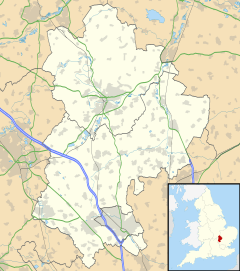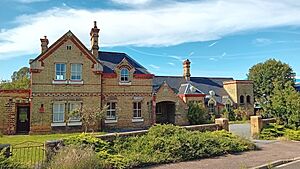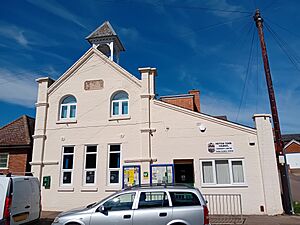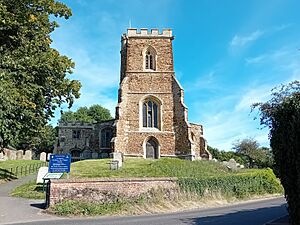Potton facts for kids
Quick facts for kids Potton |
|
|---|---|
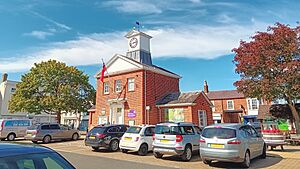 Clock House in Market Square |
|
| Population | 5,727 (Parish, 2021) 5,230 (Built-up area, 2021) |
| OS grid reference | TL2249 |
| Civil parish |
|
| Unitary authority | |
| Ceremonial county | |
| Region | |
| Country | England |
| Sovereign state | United Kingdom |
| Post town | SANDY |
| Postcode district | SG19 |
| Dialling code | 01767 |
| Police | Bedfordshire |
| Fire | Bedfordshire and Luton |
| Ambulance | East of England |
| EU Parliament | East of England |
| UK Parliament |
|
Potton is a small town and parish in Bedfordshire, England. It's about 10 kilometres (6 miles) east of Bedford, the county town. In 2021, about 5,727 people lived here. A big event in Potton's history was the Great Fire in 1783, which destroyed much of the town. The local church, St Mary's, was built in the 13th century. Potton was also famous for its large horse fairs.
Contents
Potton's Past: A Look at History
The name Potton comes from old English words meaning "farm where pots are made." This suggests that pottery was an important activity here long ago.
Archaeologists found signs of an early Iron Age settlement in 2009. They discovered old ditches, a pit, and pieces of pottery. This shows people lived in Potton thousands of years ago!
Markets and Fairs: Busy Trading Days
Potton was given permission to hold a market by King William II way back in 1094. This market became one of the biggest in Bedfordshire during the Tudor and Stuart times. However, it became smaller after the Great Fire in 1783. In the 1800s, people mainly traded corn and straw.
A fair was also allowed by King Henry II in 1227. By 1831, fairs were held four times a year. Potton's horse fairs were especially famous and attracted people from all over the country. These fairs continued until 1932.
The town square used to have special market stalls called The Shambles. These were replaced by brick buildings in 1797. Later, these buildings became old and were taken down after World War II. A new library was built in their place, called Clock House. It opened in 1956 and has the old clock from The Shambles. The clock was updated in 2006 with a new automatic system.
The Great Fire of Potton
In 1783, a huge fire started in a field near what is now Spencer Close. It quickly spread and destroyed many parts of Potton, including King Street and half of the Market Square. The fire burned for a whole day! Luckily, the 13th-century parish church, St Mary's, survived. After the fire, the town was rebuilt, which is why many buildings in Potton today are in the Georgian style.
The Sandy and Potton Railway
The Sandy and Potton Railway, also known as Captain Peel's Railway, opened on November 9, 1857. It was built by Captain Sir William Peel, a brave naval officer. When the main railway line reached Sandy in 1850, Captain Peel decided to build a branch line to his home and then on to Potton.
The railway's engine was named Shannon, after the ship Captain Peel commanded. Sadly, Captain Peel never saw his railway in action because he passed away in India in 1858. The Shannon engine is now kept at the National Railway Museum. A local singing group, the Potton Barbershop Harmony Club, even named their group 'Shannon Express' after the famous locomotive!
Potton railway station opened in 1862 and was part of the line connecting Oxford to Cambridge. It closed in 1968. The railway made it easier for local farmers to send their produce to London.
Potton Manor and the Champion Car
Potton Manor was a large house built in the 1860s. During World War II, it was used as a laboratory. Later, it became a car factory where a car called the Champion was made. The Potton History Society bought one of these Champion cars from the National Motor Museum and plans to restore it. The manor house itself was taken down in the early 1980s.
Land Settlement Association: Helping People
In 1935, the first Land Settlement Association (LSA) was set up in Potton. This project created 30 small farms to help unemployed men from coal mining areas in northern England. They mainly raised pigs and chickens and grew plants. Potton's LSA became a model for 20 other similar projects across the country.
Air Crash in Potton Wood
On September 18, 1945, a B-24 Liberator bomber plane crashed on the edge of Potton Wood. Four people died in the accident. You can still see the spot where it happened.
Potton's Location and Surroundings
Potton is located about 10 kilometres (6 miles) east of Bedford and 15 kilometres (9 miles) southwest of Cambridge. It's also about 43 kilometres (27 miles) north of London. The B1042 road connects Potton to Sandy and Wrestlingworth, and the B1040 connects it to Biggleswade and Gamlingay.
Potton is surrounded by other towns and villages:
 |
Everton | Gamlingay |  |
|
| Sandy | Cockayne Hatley | |||
| Sutton | Wrestlingworth |
The area around Potton is mostly farmland. There are also some woodlands like Pegnut Wood and Potton Wood. To the northwest of the town, there is a sand quarry.
The ground in Potton is made of a geological formation called Potton Sands, which dates back to the Early Cretaceous period. Fossils, including dinosaur remains, have been found here!
How Potton is Governed
Potton has two levels of local government:
- Potton Town Council: This council has 15 members and meets at the Community Centre. The Community Centre used to be the town's fire station, built in 1887.
- Central Bedfordshire Council: This is a larger council that covers Potton and other nearby areas. Potton is represented by one councillor on this council.
Potton is part of the North East Bedfordshire area for the UK Parliament.
Getting Around: Public Transport
Buses run from Potton to nearby towns like Biggleswade, Hitchin, and Sandy. There are also special bus trips on certain days to Cambridge and St. Neots.
The closest train stations are in Sandy and Biggleswade.
Public Services in Potton
The water in Potton is supplied by Anglian Water and comes from underground sources. It is considered "hard water." There is also a water treatment works and a water tower in the area.
For electricity, UK Power Networks is the main company. Cadent Gas manages the gas supply.
The nearest hospitals are Bedford and Lister Hospital, Stevenage. Ambulance services are provided by the East of England Ambulance Service. Potton has a fire station staffed by local firefighters.
You can find a public library in the Market Square and a post office at Brook End.
Important Landmarks
In the cemetery, there is a memorial cross dedicated to the men from Potton who lost their lives in the First and Second World Wars. A brass plaque with the same names is also in the parish church.
Media and Local News
For local news and TV, people in Potton can watch BBC East and ITV Anglia.
Local radio stations include BBC Three Counties Radio (95.5 FM), Heart East (96.9 FM), and BigglesFM (104.8 FM), which broadcasts from Potton. The local newspaper is The Biggleswade Chronicle.
Sports and Fun Activities
The Henry Smith Playing Field has a children's play area and a skate park. It's also where events like "Picnic in the Park" and "Party on Potton" are held.
Potton has a football club called Potton United F.C., which plays at The Hollow. There's also Potton Colts, a youth football club for kids aged 6–16.
Potton Town Cricket Club also plays at The Hollow. They have both junior and senior teams that play in different leagues.
Potton History Society
If you're interested in history, Potton has an active History Society with over 100 members. They meet regularly at the Community Centre.
Places of Worship
The parish church of St Mary's is on a small hill not far from the town centre. It has a tall tower with six bells. There is also a separate cemetery that opened in 1880.
Potton's Economy
Potton used to have its own brewery from around 1784 until 1922. After it closed, brewing returned to Potton in 1998 with the Potton Brewery Company, though it later closed. A new brewery is now being planned! Potton is also home to Potton Homes, a company that builds houses in a special mock-Tudor style.
A sand quarry operates to the northwest of the town. There's also a large tree nursery and a poultry farm nearby.
Even with these local businesses, many people in Potton travel to other places for work, especially to London or Cambridge.
Famous People from Potton
- Joel Beckett (born 1973), an actor, was born in Potton.
- Freddie Hinds (born 1999), a professional footballer, played as a striker for Bristol City.
See also
 In Spanish: Potton (Bedfordshire) para niños
In Spanish: Potton (Bedfordshire) para niños
 | Sharif Bey |
 | Hale Woodruff |
 | Richmond Barthé |
 | Purvis Young |


